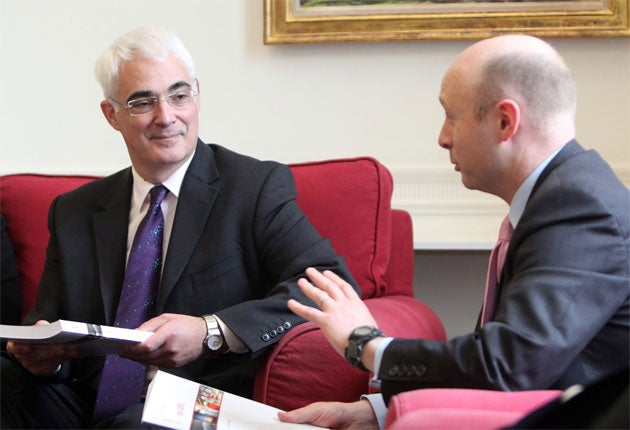Budget figures are not based on reality, say experts
Over-optimistic growth forecasts mean Labour could fail to hit deficit target

Your support helps us to tell the story
From reproductive rights to climate change to Big Tech, The Independent is on the ground when the story is developing. Whether it's investigating the financials of Elon Musk's pro-Trump PAC or producing our latest documentary, 'The A Word', which shines a light on the American women fighting for reproductive rights, we know how important it is to parse out the facts from the messaging.
At such a critical moment in US history, we need reporters on the ground. Your donation allows us to keep sending journalists to speak to both sides of the story.
The Independent is trusted by Americans across the entire political spectrum. And unlike many other quality news outlets, we choose not to lock Americans out of our reporting and analysis with paywalls. We believe quality journalism should be available to everyone, paid for by those who can afford it.
Your support makes all the difference.The growth forecasts in Alistair Darling's Budget today could prove too optimistic, according to independent research carried out for MPs. The gap means that Labour could fail to achieve its goal to halve the huge deficit in the public finances in four years without raising taxes or making deeper spending cuts than it plans.
In his eve-of-election Budget, the Chancellor is expected to confirm his previous forecast that the economy will grow by 2 per cent in the financial year starting next month. But an analysis of independent forecasters by the House of Commons Library puts their average prediction at just 1.1 per cent. While the Treasury will predict growth of 3.25 per cent for each of the following four years, independent analysts forecast an average of 2.1, 2.4, 2.7 and 2.5 per cent respectively over the same period.
The Library report admits that Treasury predictions are broadly in line with what happened after the recessions of the 1980s and 1990s. But it warns that, if the outside forecasters are right, the Government could breach its own Fiscal Responsibility Act, which says the deficit must be halved by the 2013-14 financial year. "To prevent such a breach from occurring, the Government would need to tighten fiscal policy more than currently planned," it says.
However, Mr Darling stuck to his pledge to halve the deficit in a YouTube broadcast last night, saying Britain was now at "a pretty critical stage". He said: "If we're going to get the jobs in the future we've got to have a Budget that ensures that we have growth. And of course Government can't do everything itself, but what Government can do is help unlock private sector investment so that we can bring the new investment that will bring the jobs that we need in the future."
There was a pre-Budget boost for the Chancellor yesterday when a ComRes survey found that MPs are more optimistic that the economy will grow over the next 12 months than at any time in the past five years. Some 45 per cent of Tory backbenchers think the economy will grow, 42 per cent believe it will stay the same and 13 per cent that it will get worse. However, Tory MPs are less optimistic than their Labour counterparts about unemployment, inflation and interest rates.
Although Mr Darling has already ruled out traditional pre-election giveaways, ministers hope his focus on jobs and growth will pay some dividends at the election expected on 6 May. His measures will include a £2bn "green" investment fund to finance projects such as wind farms and other renewable energy schemes. The Chancellor will warn that the immediate spending cuts demanded by the Tory opposition would put the tentative recovery at risk.
Ministers will anxiously await the City's verdict on the Budget. Jonathan Loynes, chief European economist at Capital Economics, said: "It [the City] will be looking for at least some signal that the Government recognises the need to put the public finances in order more quickly than current plans show. If we don't see that tomorrow ... then I think we'll see the City punish the Chancellor with a further sell-off in the exchange rate and a further rise in the interest rates that the Government has to pay to borrow."
In an attempt to reassure the financial markets, Mr Darling is likely to devote much of his "windfall" from lower-than-expected government borrowing to reduce the £178bn deficit originally forecast for the current financial year. He is likely to order the part-nationalised Royal Bank of Scotland and Lloyds to provide a further £90bn in lending to business. There will be a new requirement on banks to provide a basic account to every adult to tackle the "financial exclusion" faced by an estimated 1.75 million people.
In a pre-emptive strike last night, the Tories raised the spectre of Britain's economy becoming as sickly as that of Greece. David Cameron said the Budget will show the "stark difference" between the two main parties. Labour's reluctance to start cutting spending this year was "completely wrong", he said, and more "urgency, energy and vision" was needed. Without prompt action, Britain faced slipping into a "danger zone", with rising interest rates and eroding confidence in the financial markets, he added. The Tory leader attacked Labour for telling "lies" in its election literature, with claims that the Tories would cut help for pensioners.
Join our commenting forum
Join thought-provoking conversations, follow other Independent readers and see their replies
Comments